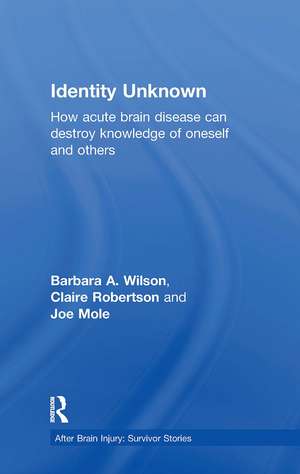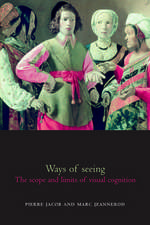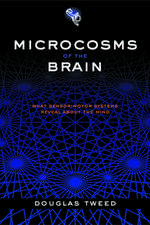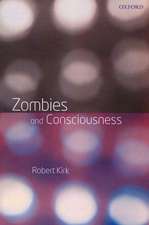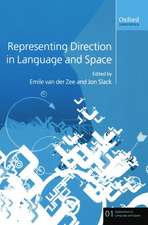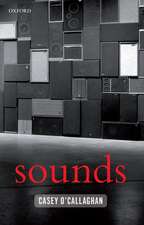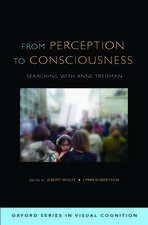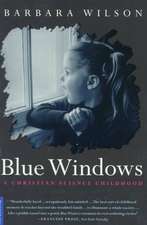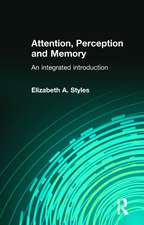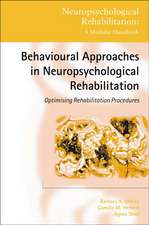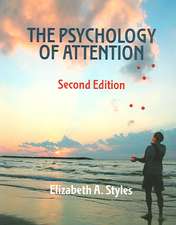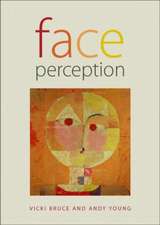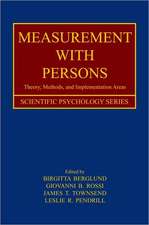Identity Unknown: How acute brain disease can destroy knowledge of oneself and others: After Brain Injury: Survivor Stories
Autor Barbara A. Wilson, Claire Robertson, Joe Moleen Limba Engleză Hardback – 20 oct 2014
Identity Unknown gives an exceptional, poignant and in-depth understanding of what it is like to live with the severe after-effects of brain damage caused by a viral infection of the brain. It tells the story of Claire, a nurse, wife, and mother of four, who having survived encephalitis, was left with an inability to recognise faces – a condition also known as prosopagnosia together with a loss of knowledge of people and more general loss of semantic memory
Part One describes our current knowledge of encephalitis, of perception and memory, and the theoretical aspects of prosopagnosia and semantic memory. Part Two, told in Claire’s own words, is an account of her life before her illness, her memories of the early days in hospital, an account of the treatment she received at the Oliver Zangwill Centre, and her description of the long-term consequences of encephalitis. Claire’s profound insights, clear writing style, and powerful portrayal of her feelings provide us with a moving insider’s view of her condition. These chapters also contain additional commentary from Barbara Wilson, providing further detail about the condition, treatment possibilities, potential outcomes, and follow-up options.
Identity Unknown provides a unique personal insight into a condition which many of us have, for too long, known too little about. It will be of great interest to a broad audience including professionals working in rehabilitation settings, and all those who have sustained a brain injury, their families and carers.
| Toate formatele și edițiile | Preț | Express |
|---|---|---|
| Paperback (1) | 231.32 lei 6-8 săpt. | |
| Taylor & Francis – 20 oct 2014 | 231.32 lei 6-8 săpt. | |
| Hardback (1) | 1033.40 lei 6-8 săpt. | |
| Taylor & Francis – 20 oct 2014 | 1033.40 lei 6-8 săpt. |
Din seria After Brain Injury: Survivor Stories
-
 Preț: 198.70 lei
Preț: 198.70 lei -
 Preț: 198.14 lei
Preț: 198.14 lei -
 Preț: 199.56 lei
Preț: 199.56 lei -
 Preț: 175.41 lei
Preț: 175.41 lei -
 Preț: 178.05 lei
Preț: 178.05 lei -
 Preț: 178.75 lei
Preț: 178.75 lei -
 Preț: 138.98 lei
Preț: 138.98 lei -
 Preț: 176.02 lei
Preț: 176.02 lei -
 Preț: 154.72 lei
Preț: 154.72 lei -
 Preț: 152.99 lei
Preț: 152.99 lei -
 Preț: 198.26 lei
Preț: 198.26 lei -
 Preț: 353.00 lei
Preț: 353.00 lei -
 Preț: 198.11 lei
Preț: 198.11 lei -
 Preț: 227.31 lei
Preț: 227.31 lei -
 Preț: 231.32 lei
Preț: 231.32 lei -
 Preț: 293.46 lei
Preț: 293.46 lei -
 Preț: 205.21 lei
Preț: 205.21 lei -
 Preț: 230.23 lei
Preț: 230.23 lei -
 Preț: 211.23 lei
Preț: 211.23 lei -
 Preț: 214.68 lei
Preț: 214.68 lei -
 Preț: 205.80 lei
Preț: 205.80 lei -
 Preț: 154.97 lei
Preț: 154.97 lei
Preț: 1033.40 lei
Preț vechi: 1260.24 lei
-18% Nou
Puncte Express: 1550
Preț estimativ în valută:
197.86€ • 206.04$ • 164.17£
197.86€ • 206.04$ • 164.17£
Carte tipărită la comandă
Livrare economică 14-28 februarie
Preluare comenzi: 021 569.72.76
Specificații
ISBN-13: 9781848722842
ISBN-10: 1848722842
Pagini: 188
Ilustrații: 38
Dimensiuni: 138 x 216 x 23 mm
Greutate: 0.35 kg
Ediția:1
Editura: Taylor & Francis
Colecția Psychology Press
Seria After Brain Injury: Survivor Stories
Locul publicării:Oxford, United Kingdom
ISBN-10: 1848722842
Pagini: 188
Ilustrații: 38
Dimensiuni: 138 x 216 x 23 mm
Greutate: 0.35 kg
Ediția:1
Editura: Taylor & Francis
Colecția Psychology Press
Seria After Brain Injury: Survivor Stories
Locul publicării:Oxford, United Kingdom
Public țintă
General, Professional, and Professional Practice & DevelopmentCuprins
PART ONE 1. Encephalitis 2. An introduction to visual perceptual disorders and to the agnosias 3. Theoretical Accounts of Prosopagnosia 4. The Self and Identity PART TWO 5. Life before the illness: Claire’s account 6. Calling my husband Stephanie 7. Kissing a cauliflower 8. Together we can 9. The red group - ‘learning to belong to my own life’ 10. A face is not a person 11. Strategies that have helped 12. Can you believe your eyes? Sight difficulties following encephalitis 13. ‘Metallic not sour’ and pieces of the jigsaw 14. Paddling through the river and stepping on stones: An Overall Summary of my Life Since Encephalitis 15. Final last thoughts
Recenzii
‘While this book provides a theoretical account of Encephalitis and subsequent disorders of visual perception and agnosias, which will be useful to students, clinicians, people affected, and their families, it really comes into its own by including an extraordinarily in-depth case study by Claire, a survivor of herpes simplex encephalitis. In a break away from many traditional texts, containing only medical and academic observations and analyses, Claire’s own narrative, along with that of her husband Ed and therapists involved in her treatment, are interwoven into the text. This provides great insight and is at times both uplifting and harrowing. These narratives demonstrate how very complex the brain is and how our desire to compartmentalise it and the effects it has upon people, once damaged, is quite simply not possible. We see from this detailed story how encephalitis strikes at the very core of a person’s identity, throwing into flux not only their own life but that of those around them – traditional family dynamics and love are tested in ways we can only hope we never experience ourselves.’ - Ava Easton, Chief Executive, The Encephalitis Society
‘This book will be of interest to clinicians, people who have experience with encephalitis, and anyone who might wish to learn more about some of the intricate ways in which our brains help us makes sense of the world. It is an extremely readable account of the nature of encephalitis and the kinds of perceptual and cognitive impairments that people who suffer encephalitis can experience.
Most importantly, this book provides a vivid, courageous and moving account of the impact of encephalitis from the perspective of Claire, an articulate woman who has learned to live with the condition. Claire’s description of her journey through illness and recovery provides insights into what the world is like when suddenly all that was familiar is unfamiliar.
The book includes authoritative overviews of the medical and neuropsychological effects of encephalitis as well as Claire’s narrative along with asides from her husband and therapists and notes of clarification and expansion from Barbara Wilson. Combined, it provides a comprehensive, knowledgeable and uplifting account of living with the effects of encephalitis.’ - Skye McDonald, School of Psychology, UNSW Sydney, Australia
‘In this book Wilson, Robertson, and Mole provide the reader with a comprehensive review of the neurobehavioral and psychosocial ramifications of prosopagnosia. The cognitive and neural substrates of prosopagnosia are presented in a manner that is accessible to readers so that they come away with a clear understanding as to how the condition emerges and how it is conceptualized by neuroscientists. Even more compelling is Claire's first-hand account of alterations in her personal memories, sense of self, and her capacity to feel whole. The dialogue between Claire and her therapeutic team sets the stage for well-articulated therapeutic goals suited to her lifestyle as well as her cognitive, perceptual, and emotional needs. The bar is set high and the mantra, established early in her program, is "together we can." This book is a wonderful guide for the patients, caregivers and clinicians who seek education and guidance regarding optimal adaptation to brain damage’. – Margaret O'Connor, Harvard Medical School, USA
This is a unique book about, and by, a remarkable person called Claire. At age 43, having previously been completely well and living an active and successful professional and family life, Claire was afflicted by a rare and severe brain disease, Herpes Simplex Virus Encephalitis, or HSVE for short. The book warrants the label ‘unique’ because of the variety of perspectives that it offers on Claire’s illness. These different perspectives are provided (a) by the clinicians who designed, implemented and monitored Claire’s post-disease rehabilitation; (b) by the researchers who were already knowledgeable about the types of deficit that can result from HSVE, and who performed many assessments and investigations with Claire to increase this knowledge for themselves and for the entire field of neuropsychology; and (c) by Claire herself. Claire warrants the label "remarkable" because of her experiences of this devastating illness, and even more so because of her ability and willingness to write about those experiences. Even the most expert and insightful neurologists and neuropsychologists, with substantial knowledge about the deficits associated with a brain disease like HSVE, can only know the consequences from the outside looking in. They, and we, rarely have the opportunity to hear an extensive account of those experiences from the perspective of a true ‘insider’ like unlucky but valiant Claire. I strongly recommend this book. - Karalyn Patterson, Department of Clinical Neurosciences, University of Cambridge, UK
This book takes a unique approach by merging our scientific understanding of prosopagnosia (face blindness) and identity loss with a first-hand account of everyday life with the condition. While Barbara Wilson and Joe Mole present a comprehensive yet accessible account of the cognitive and neural underpinnings of prosopagnosia and identity loss, Claire Robertson offers an insightful and often emotional reflection on life without person recognition skills. This book is a must-read for those with a professional or general interest in neurorehabilitation, and presents a poignant reminder of the need to raise awareness of this relatively unknown condition. - Sarah Bate, Department of Psychology, Bournemouth University, UK
‘This book will be of interest to clinicians, people who have experience with encephalitis, and anyone who might wish to learn more about some of the intricate ways in which our brains help us makes sense of the world. It is an extremely readable account of the nature of encephalitis and the kinds of perceptual and cognitive impairments that people who suffer encephalitis can experience.
Most importantly, this book provides a vivid, courageous and moving account of the impact of encephalitis from the perspective of Claire, an articulate woman who has learned to live with the condition. Claire’s description of her journey through illness and recovery provides insights into what the world is like when suddenly all that was familiar is unfamiliar.
The book includes authoritative overviews of the medical and neuropsychological effects of encephalitis as well as Claire’s narrative along with asides from her husband and therapists and notes of clarification and expansion from Barbara Wilson. Combined, it provides a comprehensive, knowledgeable and uplifting account of living with the effects of encephalitis.’ - Skye McDonald, School of Psychology, UNSW Sydney, Australia
‘In this book Wilson, Robertson, and Mole provide the reader with a comprehensive review of the neurobehavioral and psychosocial ramifications of prosopagnosia. The cognitive and neural substrates of prosopagnosia are presented in a manner that is accessible to readers so that they come away with a clear understanding as to how the condition emerges and how it is conceptualized by neuroscientists. Even more compelling is Claire's first-hand account of alterations in her personal memories, sense of self, and her capacity to feel whole. The dialogue between Claire and her therapeutic team sets the stage for well-articulated therapeutic goals suited to her lifestyle as well as her cognitive, perceptual, and emotional needs. The bar is set high and the mantra, established early in her program, is "together we can." This book is a wonderful guide for the patients, caregivers and clinicians who seek education and guidance regarding optimal adaptation to brain damage’. – Margaret O'Connor, Harvard Medical School, USA
This is a unique book about, and by, a remarkable person called Claire. At age 43, having previously been completely well and living an active and successful professional and family life, Claire was afflicted by a rare and severe brain disease, Herpes Simplex Virus Encephalitis, or HSVE for short. The book warrants the label ‘unique’ because of the variety of perspectives that it offers on Claire’s illness. These different perspectives are provided (a) by the clinicians who designed, implemented and monitored Claire’s post-disease rehabilitation; (b) by the researchers who were already knowledgeable about the types of deficit that can result from HSVE, and who performed many assessments and investigations with Claire to increase this knowledge for themselves and for the entire field of neuropsychology; and (c) by Claire herself. Claire warrants the label "remarkable" because of her experiences of this devastating illness, and even more so because of her ability and willingness to write about those experiences. Even the most expert and insightful neurologists and neuropsychologists, with substantial knowledge about the deficits associated with a brain disease like HSVE, can only know the consequences from the outside looking in. They, and we, rarely have the opportunity to hear an extensive account of those experiences from the perspective of a true ‘insider’ like unlucky but valiant Claire. I strongly recommend this book. - Karalyn Patterson, Department of Clinical Neurosciences, University of Cambridge, UK
This book takes a unique approach by merging our scientific understanding of prosopagnosia (face blindness) and identity loss with a first-hand account of everyday life with the condition. While Barbara Wilson and Joe Mole present a comprehensive yet accessible account of the cognitive and neural underpinnings of prosopagnosia and identity loss, Claire Robertson offers an insightful and often emotional reflection on life without person recognition skills. This book is a must-read for those with a professional or general interest in neurorehabilitation, and presents a poignant reminder of the need to raise awareness of this relatively unknown condition. - Sarah Bate, Department of Psychology, Bournemouth University, UK
Descriere
This book gives a rare, poignant and in depth understanding of what it is like to live with the severe after effects of brain damage caused by a viral infection of the brain. It tells the story of Claire, a survivor of encephalitis, who was left with an inability to recognise faces, also called prosopagnosia. It describes our current knowledge of the condition, and offers a unique report on daily living with a condition which many of us have, for too long, known too little about. Identity Unknown will be essential reading for professionals working in rehabilitation settings, and will also be of great interest to people who have sustained a brain injury and their families.
